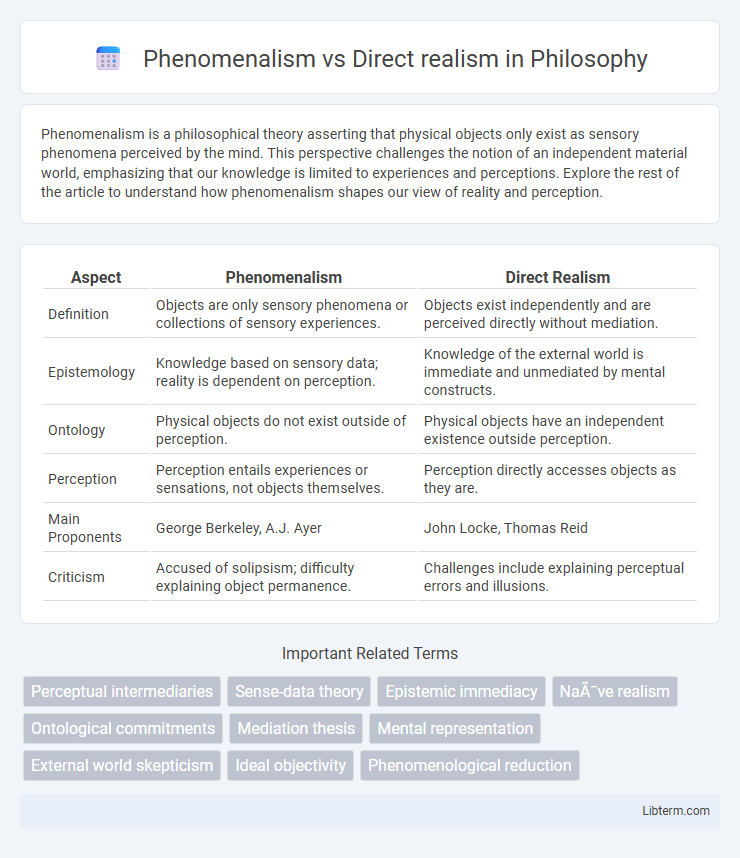Phenomenalism is a philosophical theory asserting that physical objects only exist as sensory phenomena perceived by the mind. This perspective challenges the notion of an independent material world, emphasizing that our knowledge is limited to experiences and perceptions. Explore the rest of the article to understand how phenomenalism shapes our view of reality and perception.
Table of Comparison
| Aspect | Phenomenalism | Direct Realism |
|---|---|---|
| Definition | Objects are only sensory phenomena or collections of sensory experiences. | Objects exist independently and are perceived directly without mediation. |
| Epistemology | Knowledge based on sensory data; reality is dependent on perception. | Knowledge of the external world is immediate and unmediated by mental constructs. |
| Ontology | Physical objects do not exist outside of perception. | Physical objects have an independent existence outside perception. |
| Perception | Perception entails experiences or sensations, not objects themselves. | Perception directly accesses objects as they are. |
| Main Proponents | George Berkeley, A.J. Ayer | John Locke, Thomas Reid |
| Criticism | Accused of solipsism; difficulty explaining object permanence. | Challenges include explaining perceptual errors and illusions. |
Introduction to Phenomenalism and Direct Realism
Phenomenalism posits that objects only exist as sensory phenomena perceived by the mind, emphasizing perception as the foundation of reality. Direct realism asserts that the external world exists independently and is perceived directly without intermediary mental representations. Both theories address the nature of perception but diverge on whether objects are mind-dependent (phenomenalism) or mind-independent (direct realism).
Defining Phenomenalism: Core Concepts
Phenomenalism defines objects solely through sensory experiences, asserting that physical entities are reducible to perceptual phenomena. This epistemological stance holds that all knowledge of the external world is mediated by sensory data, rejecting the existence of objects independent of perception. Core concepts include the emphasis on observable effects and the notion that physical objects are logical constructions based on collections of sensory experiences.
Defining Direct Realism: Core Concepts
Direct realism asserts that perception involves a direct, unmediated awareness of external objects as they genuinely exist, contrasting with theories that posit mental representations or sense data as intermediaries. Core concepts include the immediate apprehension of the physical world, rejecting the notion that perception is infallibly subjective or constructed solely by the mind. This framework emphasizes the reliability of sensory experience in providing accurate knowledge about the external environment.
Historical Background and Key Philosophers
Phenomenalism, rooted in the works of George Berkeley and later developed by Ernst Mach, posits that physical objects only exist as sensory phenomena perceived by the mind. Direct realism, championed by philosophers like Thomas Reid and G.E. Moore, argues for the immediate perception of objects as they exist independently of the observer's mind. These contrasting views emerged during the 18th and 19th centuries as responses to the empiricist and idealist traditions in philosophy of perception.
Perception and the Nature of Reality
Phenomenalism asserts that perception is limited to sensory experiences and that objects exist only as phenomena within the mind, emphasizing a subjective interpretation of reality. Direct realism argues that perception grants immediate awareness of objects as they exist independently, without intermediary mental representations. The debate centers on whether reality is constructed from sensory data or accessed directly through perceptual experience.
Arguments for Phenomenalism
Phenomenalism argues that physical objects are logical constructions out of sensory experiences, emphasizing that empirical data consists solely of perceptions rather than mind-independent objects. Advocates highlight the problem of perceptual variation and illusions, suggesting that direct realism fails to account for discrepancies in sensory input. Phenomenalism also contends that knowledge of the external world is grounded in observable phenomena, thus avoiding metaphysical assumptions about the existence of objects beyond experience.
Arguments for Direct Realism
Direct realism argues that perception involves a direct awareness of external objects without intermediary representations, emphasizing the transparency of sensory experience as strong evidence. Proponents highlight the consistency and immediacy of perceptual experiences, which align closely with the actual properties of objects in the environment. Empirical studies in neuroscience and psychology support direct realism by demonstrating real-time interaction between sensory inputs and the physical world, challenging the skepticism inherent in phenomenalism.
Criticisms and Counterarguments
Phenomenalism faces criticism for reducing reality to sensory experiences, leading to skepticism about the existence of an external world independent of perception. Critics argue this view struggles to explain the consistency and shared nature of objects among different observers. Direct realism counters by affirming the existence of mind-independent objects but faces challenges in accounting for perceptual illusions and errors, which suggest that sensory experiences do not always provide accurate access to reality.
Implications for Epistemology and Science
Phenomenalism asserts that knowledge is limited to sensory experiences, implying that scientific theories describe phenomena rather than mind-independent realities, which challenges the objective basis of epistemology. Direct realism posits that perception grants immediate access to the external world, supporting a more straightforward epistemic relationship between observers and physical objects, thereby reinforcing empirical science's claims about reality. These differing views impact the interpretation of scientific data and the justification of knowledge claims, influencing debates on the nature and limits of human understanding.
Contemporary Debates and Future Directions
Contemporary debates between phenomenalism and direct realism center on the nature of perception, with phenomenalism positing that objects are reducible to sensory experiences, while direct realism argues for immediate awareness of external objects independent of perception. Advances in neuroscience and cognitive science have fueled arguments for direct realism by highlighting the brain's role in constructing perceptual experiences that correspond to real-world stimuli. Future directions involve integrating phenomenological insights with empirical findings to resolve tensions, potentially leading to hybrid theories that reconcile subjective experience with objective reality.
Phenomenalism Infographic

 libterm.com
libterm.com